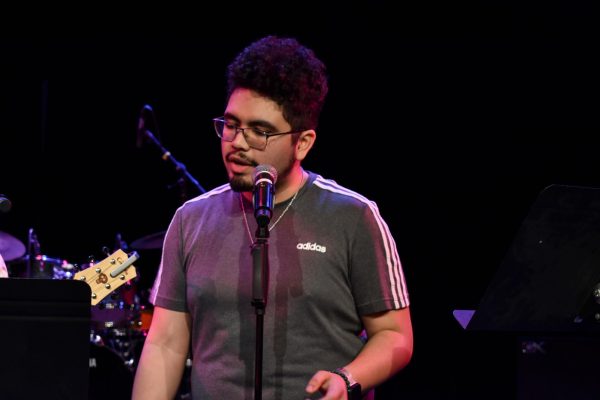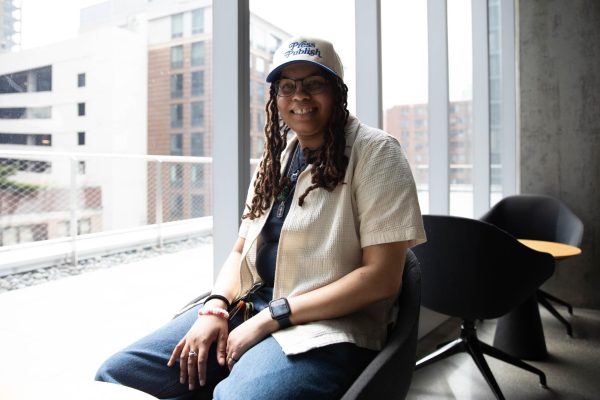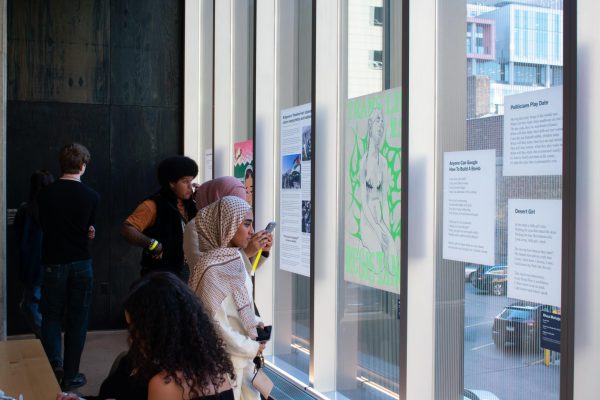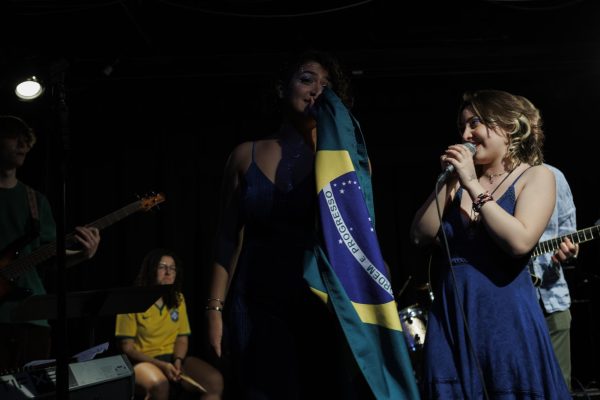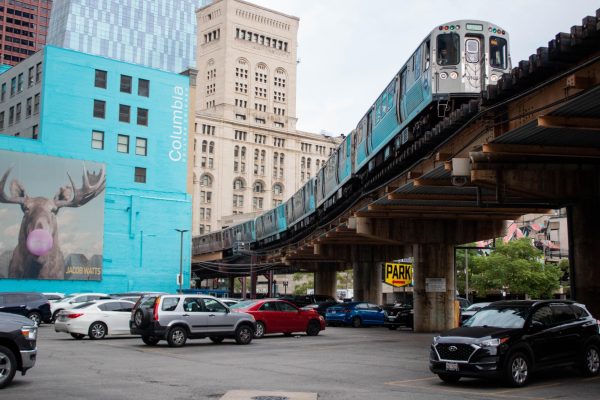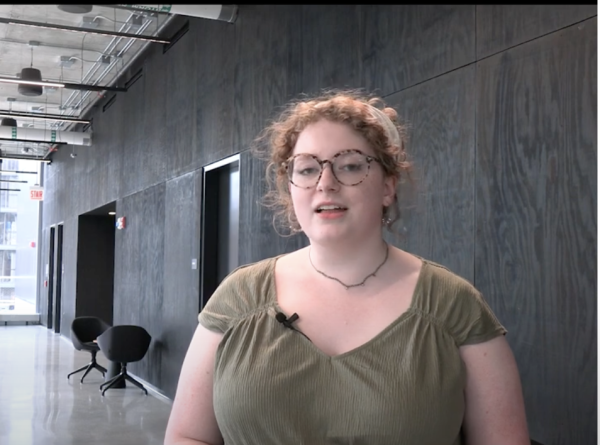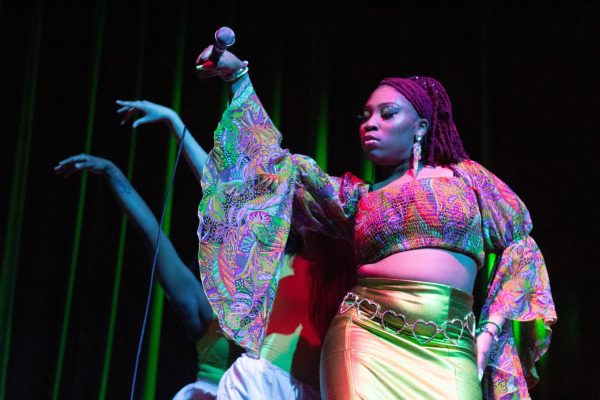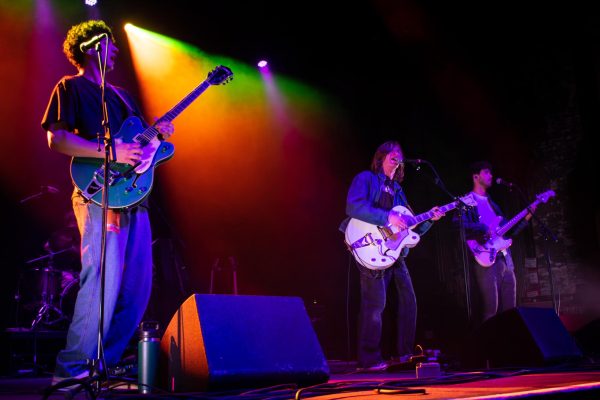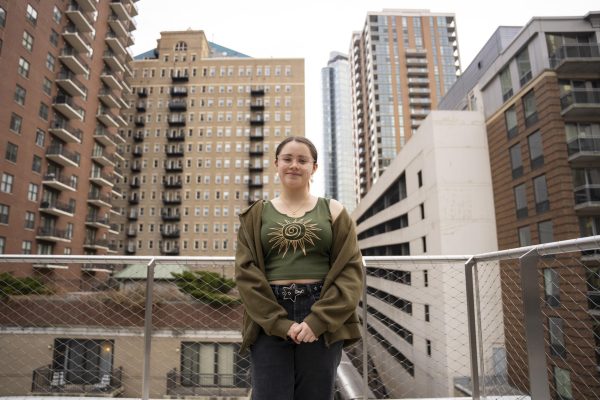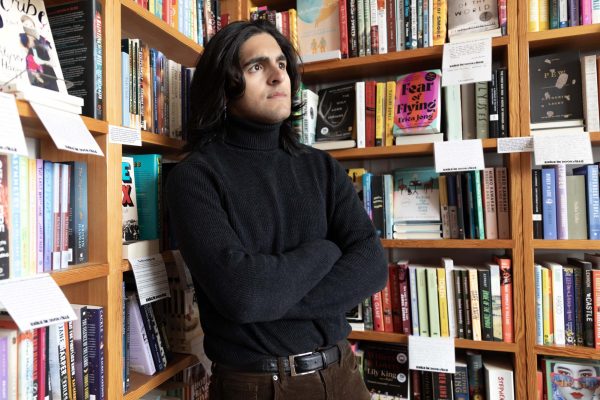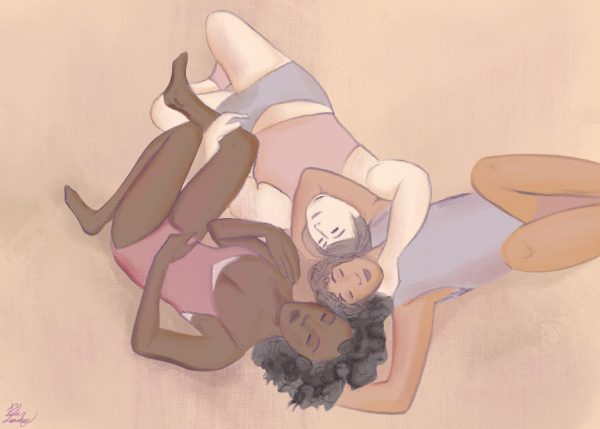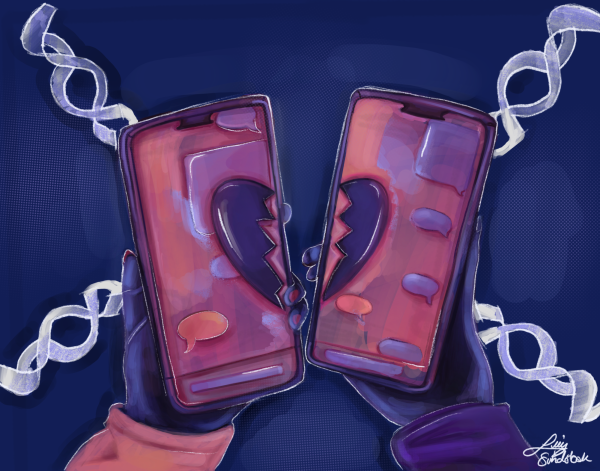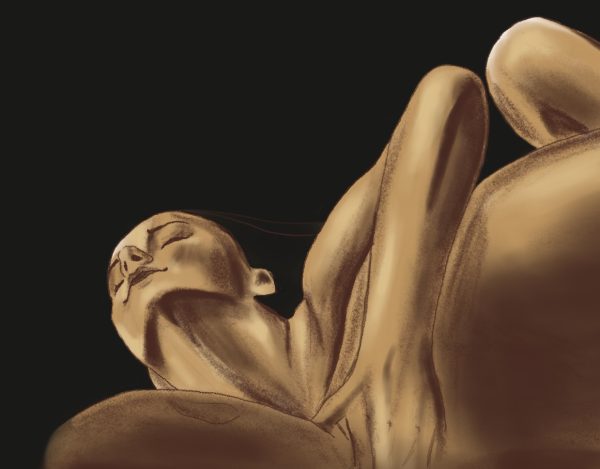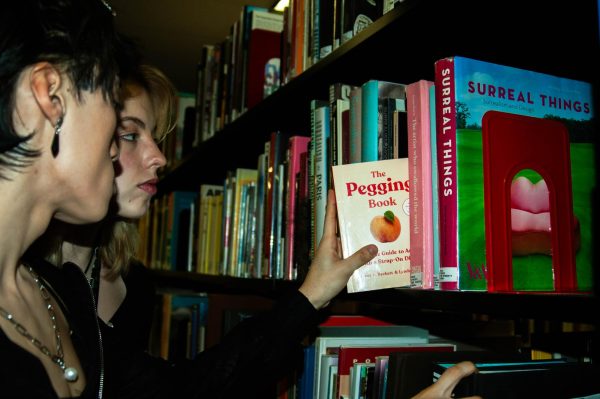Rocking the vote
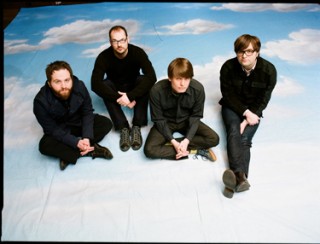
September 29, 2008
As the election season heats up, artists and groups like Death Cab for Cutie are helping to get young voters to register and show up at the polls on Election Day. The band is participating in the Ultimate College Bowl, a drive to get college students to register to vote and win prizes for the number of students registered. Death Cab for Cutie has agreed to give a free concert at the college that gets the most
students registered to vote.
The Chronicle spoke with guitarist Chris Walla to talk politics, music and why voting is so important to him and the band.
The Chronicle: What is the goal of the Ultimate College Bowl?
Chris Walla: The whole goal of the Ultimate College Bowl, and ultimately us being involved in it, it’s not necessarily about the candidate this time. It’s about getting people involved and getting people to vote this time.
How did you first get involved with the campaign?
I think in an e-mail full of many things that we get presented from management a couple times a week. And this [Ultimate College Bowl] was something we jumped on right away. We’ve been bulking around trying to figure out how we can actually insert ourselves into this election cycle and actually be of some benefit rather than a nuisance; rather than being a pain in somebody’s a-s. This just seemed perfect, it just seemed tailor-made for a rock band who largely has a great love of our country, but has a mostly dormant interest in politics.
Why do you think it’s important for young people to vote?
Man, I don’t even know where to start. In the 2004 election, it was just really disheartening for me to find out that more people were voting for “American Idol” than were voting in the primaries. Sometimes it’s difficult to remember that everything that happens around us we have some sort of control over by checking a box on our ballot and that any change that you want to levy can start in your own town. Yes, this is a big election year, but it’s really important for people to get involved with the issues in their cities. I grew up in a neighborhood where there were no sidewalks; [it] has been fighting for years and years to get sidewalks and it’s finally getting sidewalks. But that’s all about getting involved in politics at a local level, and it’s simple stuff like that.
The college campus can be a little bit of a bubble sometimes. God, if there was ever a good reason to vote, especially with these investment banking problems and especially for college students, I think this is as good a reason, if any, to decide which presidential candidate would be best to sort this mess out and not squander our tax dollars if we move forward.
Why is there such a big focus on college voters specifically? Do you think voter registration for the older generation is equally important?
I don’t think the college votes are any more or less important than any other vote. A vote is a vote, and everyone is fantastic and critical. Many people’s first and second elections happen when they are in college, and I think that so many people’s political conscious snaps in when they get to college, too. It just feels like it’s the perfect place to zero in on registering voters. Providing a platform that makes it easy for them to register to vote and get some incentive to vote. I think it’s great that we’re playing this thing, but a $10,000 scholarship is nothing to sneeze at; I mean, that’s pretty awesome. It’s the perfect place to get people involved and hopefully keep them involved for the rest of their lives.
What lessons do you hope voters will take away from this election?
I am really hoping that the media can actually get back to some journalism at some point. It seems like the thing that is passing for journalism as of late is either stenography or it’s like a pair of perceived experts talking about some issue or another. And that’s cheaper than actual journalism, which is why the networks do it, but I think it’s been really damaging to the way that this election is getting covered. I think that it takes a lot more savvy to actually see through what’s happening [on] most of the media outlets. There’s so much information, it’s sort of hard to figure out what’s actually going on. I am far, far, far from a conspiracy theorist. I think it’s really difficult to see what’s going on. As the media sort of flails to figure out whatever the big story du jour is, I’m getting the sense that some issues are actually starting to cut through that noise and that we are getting back to some sort of substantial arguments. It remains to be seen in the debates, but I think that if people can come away from this election cycle with a sense of community-with a sense of being connected and being involved with the inner machinery of their country-then I’ll be really happy. I feel like this year there’s really a chance to make a lot of in roads with people who have previously not been involved.
Why do you think you have so much power as musicians to get through to young people?
Well, I think it’s honestly probably too much to assume that we actually do. I mean, it’s nice for us to feel like we can do something. This just seemed like the perfect fit for us.
How do you think Death Cab’s music has evolved and has that been affected by your political involvement?
I don’t know that our political involvement has really changed or been changed in Ben’s writing really. I was in Denver for the convention, and I was really inspired by walking around [on] the convention floor. It was really interesting to see all the people with all the state banners, how the populous of each state represents the way that it feels to go on tour around the country. You can really get a vibe of each of the states by the delegates on the floor. None of what we’ve done politically I think has really affected the band specifically, in terms of our content and development. But I do think that just [by] driving around our country-we’ve done like 23 or 24 national tours-you can’t help but be really changed by our country when you travel it that much. There’s so many jokes about the middle of the country being a fly-over region, and I couldn’t disagree more. I think I can safely speak for my band that I really love this country.
Your solo work is very politically charged. Do you consider Death Cab for Cutie to be an overtly political band, and have politics always been the center of conversation between you and your band mates?
Death Cab [for Cutie] has never been a political band, certainly not with a capital “P.” One of the reasons that Ben [Gibbard] is a good writer is that he has stuck to the time-honored mantra of, “write what you know.” While he can talk politics, and while he is, certainly like the rest of us, he’s involved, he votes, he loves our country and he also comes from a military family, as does Nick. It’s not the thing that drives him from day to day. It just felt like we really needed to get involved. I’ve always been fascinated by when I have a blatant interest in something and I end up taking a class or end up meeting a group of people who are simply engaging people. Through that relationship I end up getting involved in whatever it is. Over the last four-and-a-half, five years, I’ve gotten to be a real political junky. The rest of us, to a lesser degree than myself. I feel like anything we can do to encourage participation in democracy, I’m really in favor of and it’s something that we can all get behind.
In the past, musical artists like Bob Dylan and John Lennon have played a large role in the elections and voting process. What role do musicians play in preaching politics?
Musicians have a really unique role in all of this because there’s something about music and there’s something about live performance that none of us can get in any other way. There’s a built-in spokesmanship, sort of an open mic, with musicians and performers. I don’t know if it’s the expectation that they have something to say about politics. It’s happened all through history. Before Dylan there was Woody Guthrie, and before Guthrie there was a whole host of musicians and basements and porches certainly all over our country and all over the world to a certain degree.
Bands like Pearl Jam use the stage as their outlet for professing their beliefs politically, but other bands, like Oasis, think that’s a horrible idea. Do you use the stage as a platform to voice your opinion?
I think we’ve always felt uncomfortable thumping for a candidate. We do a fair amount of private advocacy, but we’re all really sensitive to the idea that, as performers, we’re entertainers; that’s what we do. When I had a day job, that was the antidote to my week at work. Now that I play in a rock band, it’s the antidote to whatever has to deal with not playing my music. We’ve always been really sensitive to that. That’s really important to us, and we don’t want to get in the way of that. That said, I think it’s impossible to keep your mouth shut. That’s something I feel really strongly about. Part of this whole UCB event is encouraging people to open their mouths and get involved when they feel strongly about something. I think that’s something that so often gets lost. We try and keep the politics to small key politics and non-partisan politics.
There has not been much energy from the music industry this election season, compared to previous elections. What’s your response?
To a degree that’s probably true. It doesn’t have anything to do with our lack of enthusiasm around the election. I think that it just has to do with the fact that it was really hard to get the youth vote engaged. I think between Obama and now Palin on the Republican ticket, people are really psyched. People are registering to vote in numbers that we’ve never seen.
Do you think any other musicians are having a positive effect in the political scene?
Ted Leo is always doing his heavy lifting. He just released an EP recently around some of the stuff that happened in St. Paul, which I think is pretty amazing. He’s kind of one of our heroes. There have been tons of bands who have been involved this year. Bright Eyes and/or Conor [Oberst] have both done stuff, The Arcade Fire has been involved. There’s lots of people being involved. Colin [Meloy], for example, from the The Decemberists has been working tirelessly on the senate race in Portland, [Ore.], and he is the one who really clued me into how that race is going. The cross-section of musicians that are involved is not terribly different than the cross section of college students or office workers or stay-at-home moms and stay-at-home dads that are involved. It’s not for everybody to be on the front lines, that’s just not how it works. But it feels like there are a lot more people this time.
When was the first time you voted and how did that impact you?
The first election I voted in was a congressional race, where there were a bunch of local representatives. And my first presidential election was in 1996 [with President Bill Clinton and Sen. Bob Dole].
What are some other reasons why people should vote?
There are so many. It’s been frustrating to watch, and this is something that I was talking about last night with some friends, for the way that the media coverage has been so monolithic and absolute in the last four weeks. It’s been really frustrating to see that there’s been barely a mention on any of the cable or network news outlets on the war in Iraq. We still have 150-odd-thousand men and women in Iraq and Afghanistan, and regardless of how you feel about the war, outside of the military towns and families in our country those people are largely out of sight, out of mind. I just feel that it’s really irresponsible for that to not be getting more regular, daily coverage in our media, even as we’re in an election cycle. Yes, the election cycle is important, and yes, this economic crisis is seemingly massive. But sometimes it feels as though our troops are simply forgotten overseas, and that really, really bothers me.
What have you seen, specifically in this election process, that gives you hope for the future?
I think just watching the enthusiasm that’s been generated by both the campaigns, since [Gov. Sarah] Palin’s been brought on it has been really encouraging. Plus, the fact that there’s a generation of people that are actually really excited. In 2004 when we did the Vote for Change campaign, sometimes it felt like pulling teeth to get people to register to vote. There was a lot of like, “Oh, it doesn’t matter, they’re both the same, whatever,” and that’s absolutely and clearly not true. Both Obama and McCain are lightning rods. They’re both really polarizing figures, and I think that both campaigns have done a really fantastic job of getting people motivated.
Are you planning on participating in any other rallies or voter registration programs before the election?
We’ve got Headcount out with us for the whole headlining portion of the tour we’re doing. There are a couple places where there will be off days. Like after the Columbus show in Ohio, where I’m going to do something, but I’m really not sure what. I’m not sure if I’m going to do something that’s really official or just door to door canvassing sort of thing.
What’s the biggest political issue for you personally going into this election?
I think it’s the war for me. In terms of big media coverage, which is the thing that most of us are connected to, it seems like it’s the forgotten issue and that is so troubling to me. That’s really, really bothersome. Unlike the other issues that get forgotten from day to day, this one involves 150,000 people who are in another country. And again, for better [or] for worse, for right or wrong regardless of what you think about it, they’re over there and that’s a fact and they are in danger. They are in harms way. And to not be reporting on that with the same kind of furvor that we have devoted to so much other either partisan or simply trivial crap is really, really frustrating to me. I think it’s irresponsible and I think it’s arrogant for us as a nation to not give that conflict and those people the attention that they so deeply deserve at home. I’m really firmly of the belief that that should be headline news every day-on the front page of every paper, on every website and the lead story of every network in our country until they are home. That conflict is too big, and there are too many people involved for that to get pushed to the back over and over again. I’m absolutely not a single issue voter, but that’s definitely my biggest thing this year.


